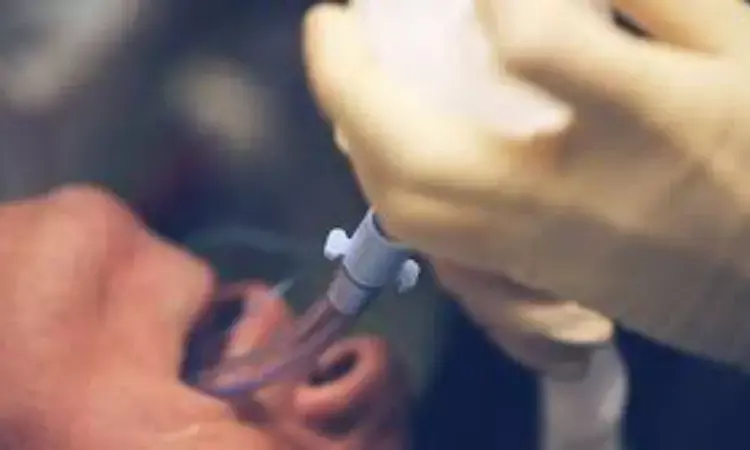- Home
- Medical news & Guidelines
- Anesthesiology
- Cardiology and CTVS
- Critical Care
- Dentistry
- Dermatology
- Diabetes and Endocrinology
- ENT
- Gastroenterology
- Medicine
- Nephrology
- Neurology
- Obstretics-Gynaecology
- Oncology
- Ophthalmology
- Orthopaedics
- Pediatrics-Neonatology
- Psychiatry
- Pulmonology
- Radiology
- Surgery
- Urology
- Laboratory Medicine
- Diet
- Nursing
- Paramedical
- Physiotherapy
- Health news
- Fact Check
- Bone Health Fact Check
- Brain Health Fact Check
- Cancer Related Fact Check
- Child Care Fact Check
- Dental and oral health fact check
- Diabetes and metabolic health fact check
- Diet and Nutrition Fact Check
- Eye and ENT Care Fact Check
- Fitness fact check
- Gut health fact check
- Heart health fact check
- Kidney health fact check
- Medical education fact check
- Men's health fact check
- Respiratory fact check
- Skin and hair care fact check
- Vaccine and Immunization fact check
- Women's health fact check
- AYUSH
- State News
- Andaman and Nicobar Islands
- Andhra Pradesh
- Arunachal Pradesh
- Assam
- Bihar
- Chandigarh
- Chattisgarh
- Dadra and Nagar Haveli
- Daman and Diu
- Delhi
- Goa
- Gujarat
- Haryana
- Himachal Pradesh
- Jammu & Kashmir
- Jharkhand
- Karnataka
- Kerala
- Ladakh
- Lakshadweep
- Madhya Pradesh
- Maharashtra
- Manipur
- Meghalaya
- Mizoram
- Nagaland
- Odisha
- Puducherry
- Punjab
- Rajasthan
- Sikkim
- Tamil Nadu
- Telangana
- Tripura
- Uttar Pradesh
- Uttrakhand
- West Bengal
- Medical Education
- Industry
Men Have Higher Risk of Extubation Failure compared to females in ICU Setting

In a recent study published in the Annals of Intensive Care uncovered a significant difference in the risk of extubation failure between male and female patients in intensive care setting.
This post hoc analysis of a large-scale clinical trial focused on patients at high risk of extubation failure in intensive care units (ICUs) and explored potential gender-related variations in prognosis. After examining data from 641 patients, this study found that 66% were males and 34% females. Also, males were more likely to be admitted for cardiac arrest and to have underlying ischemic heart disease, while females were more commonly admitted for coma and exhibited a higher risk of obesity.
The results indicated a significant disparity in the rate of reintubation at 48 hours post-extubation, with males experiencing a higher rate compared to females (11.0% vs. 6.0%). But, by day 7, while the difference persisted, it did not reach statistical significance (16.7% vs. 11.1%). Further analysis revealed that male sex was independently associated with a higher risk of reintubation within the crucial 7 days following extubation (adjusted odds ratio 1.70).
This analysis focused on a specific subset of patients at high risk of extubation failure and brought attention to the nuanced relationship between gender and critical care outcomes. When considered independently, the findings play a significant role in predicting the likelihood of reintubation, even after adjusting for various factors such as reason for admission, body-mass index, severity score, respiratory rate before extubation, and noninvasive ventilation after extubation.
Source:
Thille, A. W., Boissier, F., Coudroy, R., Le Pape, S., Arrivé, F., Marchasson, L., Frat, J.-P., Ragot, S., Muller, G., Gacouin, A., Decavèle, M., Sonneville, R., Beloncle, F., Girault, C., Dangers, L., Lautrette, A., Cabasson, S., Rouzé, A., … Vivier, E. (2023). Sex difference in the risk of extubation failure in ICUs. In Annals of Intensive Care (Vol. 13, Issue 1). Springer Science and Business Media LLC. https://doi.org/10.1186/s13613-023-01225-7
Neuroscience Masters graduate
Jacinthlyn Sylvia, a Neuroscience Master's graduate from Chennai has worked extensively in deciphering the neurobiology of cognition and motor control in aging. She also has spread-out exposure to Neurosurgery from her Bachelor’s. She is currently involved in active Neuro-Oncology research. She is an upcoming neuroscientist with a fiery passion for writing. Her news cover at Medical Dialogues feature recent discoveries and updates from the healthcare and biomedical research fields. She can be reached at editorial@medicaldialogues.in
Dr Kamal Kant Kohli-MBBS, DTCD- a chest specialist with more than 30 years of practice and a flair for writing clinical articles, Dr Kamal Kant Kohli joined Medical Dialogues as a Chief Editor of Medical News. Besides writing articles, as an editor, he proofreads and verifies all the medical content published on Medical Dialogues including those coming from journals, studies,medical conferences,guidelines etc. Email: drkohli@medicaldialogues.in. Contact no. 011-43720751


